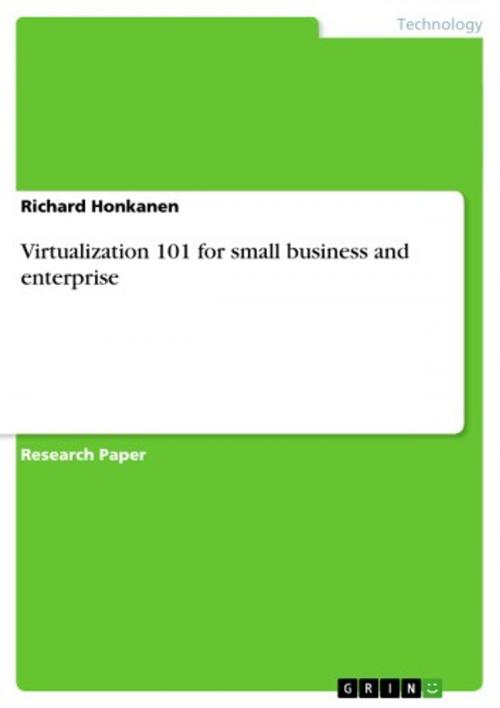| Author: | Richard Honkanen | ISBN: | 9783640124589 |
| Publisher: | GRIN Publishing | Publication: | July 31, 2008 |
| Imprint: | GRIN Publishing | Language: | English |
| Author: | Richard Honkanen |
| ISBN: | 9783640124589 |
| Publisher: | GRIN Publishing |
| Publication: | July 31, 2008 |
| Imprint: | GRIN Publishing |
| Language: | English |
Research Paper (postgraduate) from the year 2008 in the subject Technology, grade: A+, Capilano University (Capilano University, Canada), 9 entries in the bibliography, language: English, abstract: Virtualization is a new and emerging technology that is rapidly growing, taking industry by storm. In business, virtualization has become a new buzz word, but not many decision-makers actually understand what it is. In today's fiercely competitive world, it is crucial for decisionmakers to learn more about virtualization to see if it can give their organizations leverage over their competition. Not only that, virtualization can save businesses of all sizes a lot of money. Summed up in one sentence, virtualization is an information technology (IT) logistics strategy that can save businesses time and money. Today, most IT data centers use one machine for one server (e.g. one machine to serve e-mail, one for data, one for the website, etc.), causing server sprawl. Eventually businesses run out of room for new machines, leaving them stuck in a bad position. With virtualization, each server's programs, files, and processes are merged into one file (an image), and is then placed among other images on one machine. Consolidation of IT resources improves server utilization and consequently increases efficiency, lowers the electricity bill, and reduces physical footprint. It also makes deploying new servers cheap. A different approach to virtualization is making multiple physical resources appear as one physical resource, simplifying data-center operations and network administration through one consolidated virtual environment. The advantages of virtualization are almost infinite, but the main points are business continuity, saving money through outsourcing data-processing (cloud computing), and preserving legacy applications. The disadvantages are possible security problems, an initial investment up-front, and uncertainty about the roll-out process (e.g. bugs that take time to work out).
Research Paper (postgraduate) from the year 2008 in the subject Technology, grade: A+, Capilano University (Capilano University, Canada), 9 entries in the bibliography, language: English, abstract: Virtualization is a new and emerging technology that is rapidly growing, taking industry by storm. In business, virtualization has become a new buzz word, but not many decision-makers actually understand what it is. In today's fiercely competitive world, it is crucial for decisionmakers to learn more about virtualization to see if it can give their organizations leverage over their competition. Not only that, virtualization can save businesses of all sizes a lot of money. Summed up in one sentence, virtualization is an information technology (IT) logistics strategy that can save businesses time and money. Today, most IT data centers use one machine for one server (e.g. one machine to serve e-mail, one for data, one for the website, etc.), causing server sprawl. Eventually businesses run out of room for new machines, leaving them stuck in a bad position. With virtualization, each server's programs, files, and processes are merged into one file (an image), and is then placed among other images on one machine. Consolidation of IT resources improves server utilization and consequently increases efficiency, lowers the electricity bill, and reduces physical footprint. It also makes deploying new servers cheap. A different approach to virtualization is making multiple physical resources appear as one physical resource, simplifying data-center operations and network administration through one consolidated virtual environment. The advantages of virtualization are almost infinite, but the main points are business continuity, saving money through outsourcing data-processing (cloud computing), and preserving legacy applications. The disadvantages are possible security problems, an initial investment up-front, and uncertainty about the roll-out process (e.g. bugs that take time to work out).















